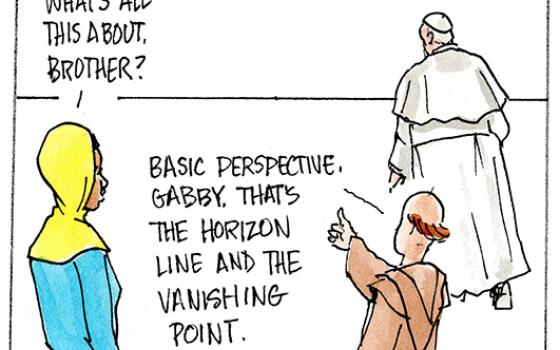A tract of the Amazon jungle burns as it is cleared by loggers and farmers near Apui, Brazil, in August 2020. Pope Francis issued a joint message for the protection of creation together with Ecumenical Patriarch Bartholomew of Constantinople and Anglican Archbishop Justin Welby of Canterbury, England. (CNS photo/Ueslei Marcelino, Reuters)
The recent extreme weather events and natural disasters show humanity is now paying the price of how it has been treating creation, said a joint message by three Christian leaders, including Pope Francis.
For the sake of younger generations and their future, "we must choose to eat, travel, spend, invest and live differently, thinking not only of immediate interest and gains but also of future benefits," the message said.
"We repent of our generation's sins," the leaders said, and join together in prayer, hoping for committed action by individuals and world leaders ahead of the United Nations climate conference, COP26, to be held in Glasgow, Scotland, in November.
The joint message was signed by the pope, Ecumenical Patriarch Bartholomew of Constantinople, an early leader in the Christian ecology movement, and Anglican Archbishop Justin Welby of Canterbury, England.
"This is the first time that the three of us feel compelled to address together the urgency of environmental sustainability, its impact on persistent poverty and the importance of global cooperation," said the joint message dated Sept. 1, the World Day of Prayer for the Care of Creation. The message was released by the Vatican Sept. 7 and it marks the monthlong Season of Creation, which runs until Oct. 4, the feast of St. Francis of Assisi, patron saint of ecology.
Advertisement
"Together, on behalf of our communities, we appeal to the heart and mind of every Christian, every believer and every person of goodwill. We pray for our leaders who will gather in Glasgow to decide the future of our planet and its people," it said.
"We must decide what kind of world we want to leave to future generations. God mandates: 'Choose life, so that you and your children might live.' We must choose to live differently; we must choose life," the joint message said.
Christianity presents a concept of stewardship, showing there is an "individual and collective responsibility for our God-given endowment," it said, as well as warnings against "adopting short term and seemingly inexpensive options of building on sand, instead of building on rock for our common home to withstand storms."
However, "we have taken the opposite direction. We have maximized our own interest at the expense of future generations," it said.
"By concentrating on our wealth, we find that long-term assets, including the bounty of nature, are depleted for short-term advantage. Technology has unfolded new possibilities for progress but also for accumulating unrestrained wealth, and many of us behave in ways which demonstrate little concern for other people or the limits of the planet," it said.
The world must make a change and "pursue generosity and fairness in the ways that we live, work and use money, instead of selfish gain," the message said.
"Today, we are paying the price. The extreme weather and natural disasters of recent months reveal afresh to us with great force and at great human cost that climate change is not only a future challenge, but an immediate and urgent matter of survival," it said.
"Tomorrow could be worse. Today's children and teenagers will face catastrophic consequences unless we take responsibility now, as 'fellow workers with God' to sustain our world," so for the sake of future generations, the message said, may Christians choose to live sustainably and be committed to prayer and dedicated to action "for a future which corresponds ever more to the promises of God."





